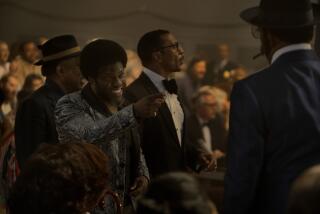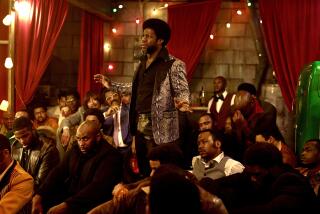In ‘Chuck,’ Liev Schreiber shows he knows a good boxing story
Liev Schreiber has voiced the fascinating stories of Canelo Alvarez, Floyd Mayweather Jr., Manny Pacquiao and more as narrator of HBO’s “24/7” series.
When it came time to select a boxing script, Schreiber veered from the successful pugilists and opted to detail the life story of a regular Joe and frequent punching bag.
In “Chuck,” which opens in theaters Friday, Schreiber portrays Chuck Wepner, a 1970s heavyweight known as the “Bayonne Bleeder” who lasted 15 rounds with Muhammad Ali and is regarded as the inspiration for Sylvester Stallone’s “Rocky.”
“I read the script and thought it was a great story. I wasn’t aware about Chuck the fighter, so, to that end, I was excited about learning about that Cleveland fight with Ali and thought that made his story worth telling,” said Schreiber, who won acclaim for his role as Boston Globe editor Marty Baron in the Oscar-winning 2015 film “Spotlight.”
While the script was in his possession for nearly a decade, Schreiber had children and began starring in the Showtime series “Ray Donovan.”
“As I kept looking at Chuck’s story, the thing that captured my imagination was that tenuous relationship to fame and celebrity and identity that, in Chuck’s case, was so interesting,” Schreiber said. “Not that there were parallels in my own life, but there’s something about that … .
“The minute we begin to believe our own press, it all starts falling apart. All of us are enchanted by the idea of the anonymous mob, the value of being loved by many as opposed to the reality of being loved by one is complicated.
“For those of us in the entertainment industry who deal with fame and celebrity, it’s something you’ve got to work out fairly early on — that while it’s a great gift to have that attention and appreciation and fame, you’ve got to take it with a grain of salt. Chuck struggled with that.”
Wepner, from Bayonne, N.J., knocked Ali down in the ninth round of their March 1975 bout, but was beaten up badly and widely outpointed on the scorecards. Heavyweights Sonny Liston, George Foreman and Duane Bobick also dealt him losses en route to a 35-14-2 career record.
The fighter let his self-importance got the better of him, travails that “Chuck” depicts in unfiltered fashion.
“Part of his character, as a person and a fighter, was he was always moving forward with his chin out into everything,” Schreiber said. “I felt like those 15 rounds he spent getting his ass whipped by Ali was a terrific metaphor for the 10 or 15 years he spent trying to satisfy his addiction to fame and identity.
“But there’s something about Chuck that is also quite grounded and sweet. Even though he was on this seemingly narcissistic journey of identity, he did it in such an interesting way that made him a classic American hero. He never stopped moving forward through all of the horrible stuff that kept happening to him and he ultimately found and treasured that singular relationship.”
Schreiber accompanied Wepner, 78, on the film’s promotional circuit and found that the storyteller who once filled reporter’s notebooks still remains.
“He’s a terrific raconteur. There’s nothing he loves more than to be at the center of that kind of event. It was fun going around with Chuck to Toronto and other places, carting the film around,” Schreiber said. “Inevitably, he was the bigger star of the situation.
“It’s hard, what Chuck goes through. It could be humiliating and embarrassing for someone who’s not as strong as he is, but his perseverance, his strength and his incredible heart — evident in just about every fight he was in — comes through.”
That theme explains why boxing stories are the gift that keeps giving from Hollywood and beyond as “Chuck” follows the recent releases of “Hands of Stone” and “Bleed for This.”
“At some level, beyond our basic nature to watch people fight and learn to survive it, there’s something about celebrating the determination and the stamina and the perseverance that is so distinctly human [in boxing],” Schreiber said. “What fighters put themselves through and the intensity of what they experience in the 15 — or 12 — rounds of a fight is so intense at some level, it’s a terrific metaphor for life.
“My experience of having spent time with prizefighters — which was shocking to me initially, but is now almost assumed — is the level of sweetness. It’s something I don’t think people realize about athletes of that caliber. They come from rough neighborhoods, they’ve been in bad situations, but if they’re at the level we like to watch, they’ve generally spent 15 years doing this with some serious regularity. That kind of discipline and tenacity takes a certain kind of character.”
Twitter: @latimespugmire
More to Read
Go beyond the scoreboard
Get the latest on L.A.'s teams in the daily Sports Report newsletter.
You may occasionally receive promotional content from the Los Angeles Times.











